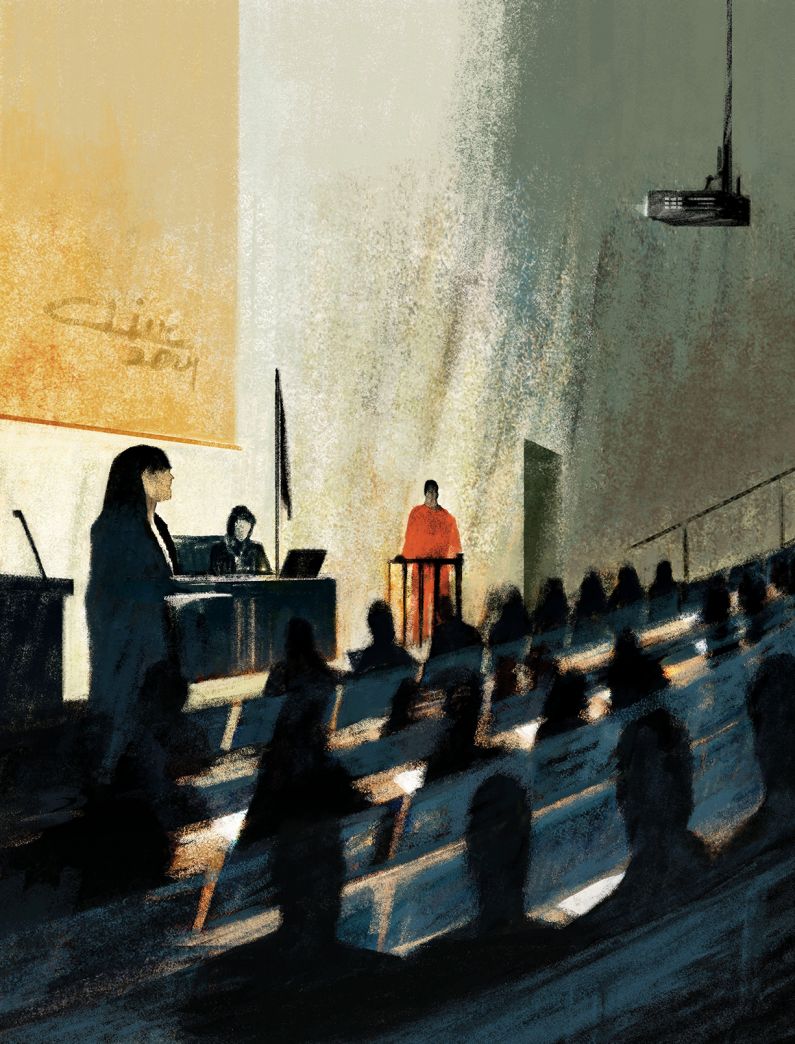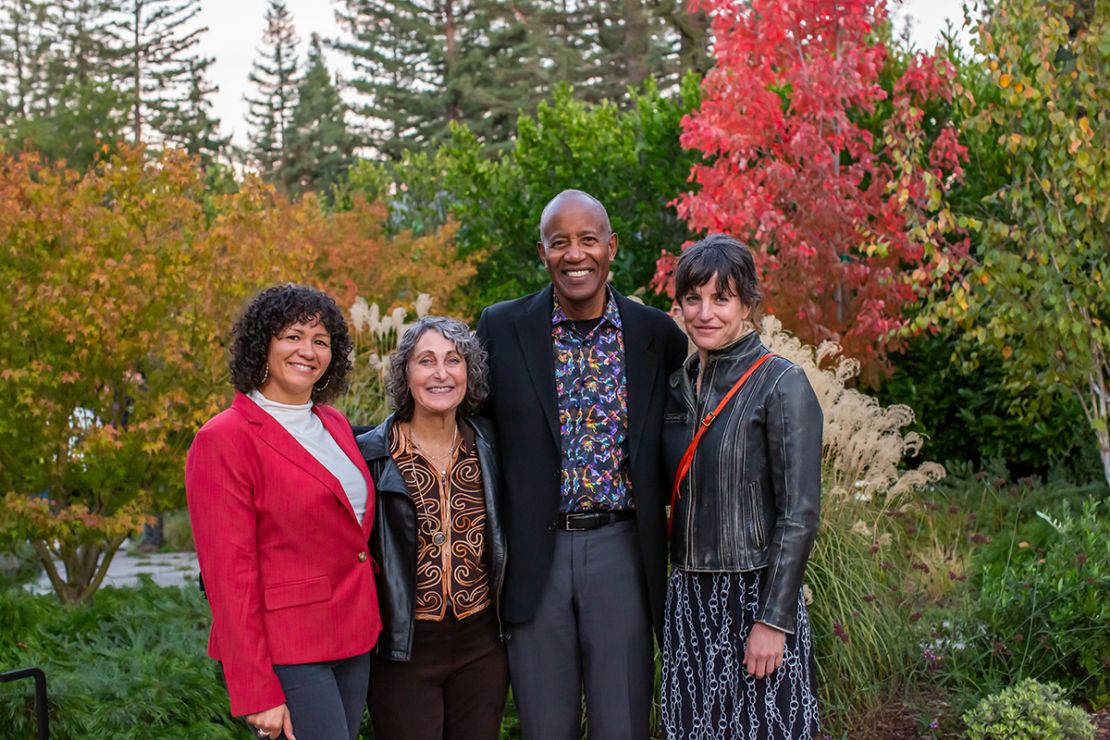A Bay Area man hopped in a friend’s car after work. The next thing he knew, he was flat on the ground, handcuffed, and surrounded by police officers with guns drawn. A search of his pockets turned up a small amount of methamphetamine. Only later would the man learn that the car in which he was riding was reported as stolen.
But then he got a lucky break. His case got the undivided attention of full-time clinic students and their advisors at the Stanford Law School Criminal Defense Clinic, which took on the case through the San Mateo County Private Defender Program. Marin Callaway, JD ’24 (BA ’18), and Holst Katsma, JD ’24 (BA ’13), moved into action, developing the Fourth Amendment defenses to the drug possession charge, drafting a motion to suppress, and preparing for what would be their first-ever court appearance.
San Diego native Callaway says the Criminal Defense Clinic is a rare opportunity for law students “because we not only work a case from start to finish in a single quarter, including investigating the facts and developing case strategy, but we often get to put on a full mini-trial in court.” A luxury of the clinic experience, she adds, “is that we are super-prepared and steeped in best practices, which is much harder later in your career when you are responsible for, say, 60 high-stakes cases at a time.” After mooting their case repeatedly, Callaway and Katsma each confidently cross-examined one of the police officers during the motion hearing. Callaway delivered her closing statement, and then they sat back and watched the judge grant their motion to suppress while quoting from their brief.

“The experience exceeded my expectations in every respect,” says Callaway who, prior to law school, wondered if she would be up to the emotional challenges of public defense work. Now, she says, that’s exactly what she wants to do.
Compassionate Representation
In late 2023, the Criminal Defense Clinic marked its first decade in its present form, as conceived by Professor Ronald Tyler, who came to SLS in 2012 after 22 years with the public defender’s office in the Northern District of California. He re-launched the clinic the following year. In November 2023, he invited alumni, faculty, staff, partner organizations, and others for two days of panel discussions and reflections on the clinic’s first decade of instruction and accomplishments.
The clinic represents indigent individuals in state and federal courts. State court clients are facing misdemeanor charges—including drug use and possession, resisting arrest, and theft—in Santa Clara and San Mateo counties. Federal clients are seeking the early termination of supervised release (similar to parole) as formerly incarcerated individuals who are shown to be rehabilitated and reintegrated into society.
No matter the case or the court, the focus is always on the client, not simply the alleged crime, Tyler says. “A public defense clinic offers the ideal opportunity to recognize, and think deeply about, the role of race and class in the criminal system,” he says. “What we do allows us to talk about, then become comfortable with, holistic and compassionate representation, along with a recognition that the issues that our clients face are so much larger than just their legal issue.”
“And criminal defense lawyers often face their own issues,” he says.

Self-Care and Coping Mechanisms
“Representing indigent clients in the chronically unfair criminal legal system can be heartbreaking as well as deeply fulfilling,” says Suzanne Luban, who co-taught with Tyler for most of the past 10 years until her retirement as the associate director of the Criminal Defense Clinic in 2023. “Addressing the emotional toll of the work has always been central to Professor Tyler’s vision for the clinic,” says Luban, adding that a high point of her decade with the clinic was the opportunity to speak out to the national media about endemic racism in policing. Two other SLS lecturers have worked with Tyler over the years as supervising clinic attorneys: Galia Amram, from 2012 to 2014, and the newest lecturer in the clinic, Carlie Ware Horne, who joined after Luban’s retirement.
Meditation, breathing exercises, and other forms of self-care and stress relief are woven into the fabric of the clinic. Tyler also leads weekly drop-in meditation sessions at the law school, which are open to the full SLS community.
Advanced clinic student Jordan Willingham Payne, JD ’24 (BA ’20), is looking ahead to her post-graduation position as a public defender with the Legal Aid Society of New York. “Too many public defenders get burned out a few years into the work,” she says. “Clinic helped me learn that if I want to do this for the long term, and I do, then I need to have strategies to de-stress and cope with the challenges.” In fall 2023, Payne, along with Cheyenne Joshua, JD ’24, secured a full dismissal for a Black man who was pulled over, ostensibly for having overly tinted windows, and charged for illegal transport of a lawfully owned and registered firearm. After she and Joshua filed their motion to dismiss, the prosecutor dismissed the case “in the interest of justice.”
Bringing the Constitution to Life
Horne, a veteran public defender who joined the clinic as its supervising attorney a year ago, says the clinic’s work is infused with a “healthy questioning” of the system: “Why do police take the actions they do, why do prosecutors make certain charging decisions? Bringing accountability to the legal system is a tremendous honor,” she says. “We bring the Constitution to life. And when we win, which happens frequently, it demonstrates that there was a constitutional error by law enforcement.”
This summer, Horne and Tyler will launch the Stanford Trial Advocacy and New Defender Uplift Program (STAND UP), a three-day program they conceived in order to provide intensive best practices training to junior public defenders from San Mateo and Santa Clara counties.
Mariam Hinds, JD ’14, says she continues to draw on the best practices she learned during her 3L clinic quarter. After several years working as a public defender with the nonprofit The Bronx Defenders in New York, Hinds went on to follow in Tyler’s footsteps: She now serves as acting co-director of the Criminal Justice Clinic at American University Washington College of Law. “Clinic was hands down the most impactful and best experience I had in law school,” she says. “I incorporate what I learned from Ron and from my fellow students into my work, virtually all the time. This is very emotionally draining work. It is hard to bear witness to horrible things happening to your clients, whom you come to care about very deeply. Clinic taught me the importance of having a supportive group of colleagues and friends to turn to. I look back on that time with great appreciation, and I am a better lawyer and teacher because of that experience.” SL